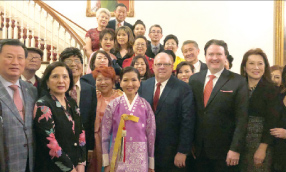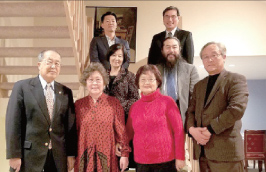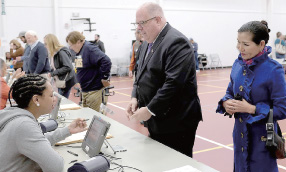Surge in Voice Phishing Scams Spoofing Actual Consulate Numbers
▶ Targeting Korean Americans with Consulate Impersonation
▶ Increasingly Sophisticated and Malicious Tactics

Voice phishing scams impersonating consulates have been rampant, particularly in the Western U.S. Last month, the Korean Consulate General in Seattle reported that over two days, three Korean Americans visited the consulate to verify suspicious calls they received. These scammers used sophisticated tactics, manipulating caller IDs to display the consulate’s actual phone number to perpetrate financial fraud. According to the Seattle Consulate, scammers mentioned the recipient’s name, threatened them with involvement in crimes like drugs or illegal bank accounts, and demanded personal information.
They claimed a warrant had been issued by the Korean Prosecutor’s Office and coerced victims to install and share Telegram IDs for a supposed security investigation, while insisting they not tell anyone else. Scammers even suggested, “If you don’t believe us, visit the consulate in person,” to gain trust. Last month, a Korean American, Hong, from Fairfax, Virginia, reported receiving a scam call impersonating a staff member of the New York Consulate General.
The scammer claimed to represent the Korean Prosecutor’s Office, instructing Hong to visit a specific website and enter their name and Korean resident registration number. When Hong expressed skepticism, the scammer connected them to another supposed “prosecutor.” Hong noted, “The website was so well-crafted that I nearly fell for it.” Earlier, a 44-year-old Korean American, Lee, from LA’s Koreatown received a call from someone posing as a Korean Embassy official. The caller claimed Lee faced legal issues in Korea and needed to “verify documents.”
They directed Lee to a supposed Prosecutor’s Office case inquiry website, providing a fraudulent address when Lee reported connectivity issues. The website address was not associated with any legitimate public institution. These voice phishing scams are evolving, often combining with drug-related crimes or exploiting advanced IT technologies like artificial intelligence (AI), necessitating heightened caution. Amid the ongoing wave of scams, the South Korean Ministry of Foreign Affairs’ statistics are criticized as being out of touch with reality. According to data submitted to Rep.
Kim Geon’s office from the People Power Party on October 2, only 16 cases of consulate-impersonating voice phishing were reported across U.S. diplomatic missions from January to September this year. Since these scams target Korean Americans using the Korean language, they are often deprioritized by U.S. law enforcement. Meanwhile, South Korean authorities cite the overseas nature of these crimes as a barrier to effective response. As a result, scammers continue to exploit this enforcement blind spot, targeting Korean Americans with impunity, while adequate countermeasures remain absent. One victim expressed frustration, stating, “After receiving a phishing call, I contacted the consulate, but they only told me to report it to local police.
Since scammers use Korean and target Korean expatriates, I wish the Korean government would work more proactively with U.S. law enforcement to eradicate these crimes.” In response, the Ministry of Foreign Affairs stated, “As consulate-impersonating voice phishing crimes have recently increased, we are strengthening prevention and response measures.” A ministry official added, “In March, we discussed countermeasures at a North American consular safety meeting, and last month, we posted a video produced by the Korean National Police Agency on preventing such scams on consulate websites to enhance our response.”
Reporters: Han Hyung-seok and Seo Han-seo
스마터리빙
more [ 건강]
[ 건강]이제 혈관 건강도 챙기자!
[현대해운]우리 눈에 보이지 않기 때문에 혈관 건강을 챙기는 것은 결코 쉽지 않은데요. 여러분은 혈관 건강을 유지하기 위해 어떤 노력을 하시나요?
 [ 건강]
[ 건강]내 몸이 건강해지는 과일궁합
 [ 라이프]
[ 라이프]벌레야 물럿거라! 천연 해충제 만들기
 [ 건강]
[ 건강]혈압 낮추는데 좋은 식품
[현대해운]혈관 건강은 주로 노화가 진행되면서 지켜야 할 문제라고 인식되어 왔습니다. 최근 생활 패턴과 식생활의 변화로 혈관의 노화 진행이 빨라지고
로컬뉴스
more
한미사랑의재단 연말모임
한미사랑의재단(총재 이호제)이 지난 22일 뉴저지 마당 식당에서 연말 모임을 열었다. 이날 참석자들은 식사를 함께 하고 노래를 같이 부르며 한…

한국전참전용사총회에 늘푸른농장, 배 기증
늘푸른농장(대표 김종일)은 뉴욕주 미한국전참전용사총회(회장 살 스칼라토)에 배를 기증했다. 지난 21일 롱아일랜드 스토니브룩 소재 미참전용사 …
KCS, 한인노인 대상 무료 법률 세미나
뉴욕한인봉사센터(KCS)는 지난 24일 퀸즈 코로나경로회관에서 지역 한인 노인들을 대상으로 무료 법률 세미나를 실시했다. 이날 김진욱 변호사가…
작곡가 마용일씨, 가곡 선곡집 출간
뉴욕의 한인 작곡가 마용일(79세)씨가 자신의 대표적인 가곡들을 모은 가곡 선곡집 ‘나는 이 나라 사람의 자손이외다’(예솔 출판사)를 출간했다…
사랑의 터키 한미재단에 백산 한의원, 성금 전달
21일 팰리세이즈팍 백산한의원이 한국일보 특별후원으로 쌀·터키 보내기 운동을 전개해온 사랑의 터키 한미재단에 힘을 보태고자 성금 500달러를 …
많이 본 기사
- 미 이중국적 금지… ‘배타적 시민권 법안’ 발의
- 특검, 김건희에 징역 15년·벌금 20억 구형… “국가시스템 붕괴”
- 박지성♥김민지 딸, 10살 된 근황..엄마도 놀란 폭풍 성장 “요래 됐습니다”
- “입국 금지 대상국 확대 19개서 30여국으로 검토”
- 음주운전 비극 속출 송년시즌 DUI ‘경종’
- 방탄소년단 지민 립밤 뭐길래? 오픈런→품절 대란
- 심각한 타운 치안… 대낮 흉기난동범에 경찰 총격, 일대 수시간 차단
- 현영 “두 아이 국제학교 재학, 등록금만 억대..요즘 내 물건 안 사”
- 고현정, 마른 각선미+동안 얼굴..54세 같지 않은 ‘풋풋함’
- “전자레인지에 돌리지 말라”… ‘이것’ 넣으면 1급 발암물질
- 이상민·김준호 장가 보낸 ‘돌싱포맨’ 4년 5개월 만에 종영
- AI에 맛집 묻고 지도 보며 카톡까지… ‘세 판’을 펼치다
- 한화 “제주서 위성 100기 생산… 우주산업 허브로”
- 반이민 강화 트럼프, 이민판사들 대량 해고
- ‘이 과일’ 먹고 소변 검사했더니 ‘깜짝’
- 미국 역사의 출발점- 감사절
- 이웃들에 ‘협박문자’ 한인 남성 체포
- SDSD(샌디에고주립대학교) 일대 ‘고밀도 개발’ 청사진 승인 예정
- 낙엽 청소엔 강력하지만… ‘송풍기 금지’ 갈등
- 겨울 되니 ‘이 바이러스’ 돌아왔다… “변기 뚜껑 닫고 물 내려야”
- 코스코 ‘부당한 관세 돌려달라’
- 미국에서 영감을 얻는 세계의 독재자들
- “일단 사고 보자’… ‘BNPL(선구매 후결제)’ 급증에 부실 적신호
- ‘관용기로 여친과 데이트’ 연방하원, FBI 국장 조사
- 이스라엘 정착민, 해외 자원봉사자도 공격
- 송년행사 게시판
- 다운타운 자바시장 사랑의 선물함 설치
- [집중분석] 샌버나디노 총격 10주년… 이민 논쟁을 바꾼 비극
- ‘트럼프 최측근’ 연방 검사장 꼼수 임명, 항소법원도 제동
- 내년 전자제품 가격 상승 메모리칩 품귀 계속 심화
- 백악관 꼬리 자르기?… “생존자 살해, 해군제독이 명령”
- 시니어센터 발전기금 총 210만불 기부 약정
- 윤이상, 상처입은 용
- 재외 한인단체 지원사업 2026년 수요 조사 실시
- ‘ICE 요원 복면 금지’ LA 카운티 1차 통과
- “디스플레이도 내 취향대로”… 맞춤형 테마 기능
- [미국은 지금] 라칸왈의 총성, 반이민의 쇄국 될까
- [업계] 7일까지 무료 메디케어 상담 서비스 제공
- [수요 에세이] 운명 카운셀러
- 요키치, 11번째 트리플더블… 덴버는 홈에서 4연패
- 한인타운 포함 LA 1지구 선거 벌써 ‘가열’
- 방산부문 외형 10배로 늘려 매출 37조 ‘정조준’
- 미 경제성장률, 내년 1.7%로 둔화
- “홍명보호, 2026 월드컵 우승확률 0.3%···스페인 17%로 1위”
- [만화경] ‘올해의 인물’ 1위 후보 ‘AI’
- LPGA 퀄리파잉 시리즈 파이널 방신실·이동은·이정은 등 출격
- 차·반도체 ‘원화 약세 수혜’ 는 옛말… 고환율 ‘발등의 불’
- LA 연방 이민국 건물에 화염병 투척 50대 체포
- 파월 침묵했지만… 시장은 ‘금리 인하’
- 트럼프 “연준의장 내년초 발표”… 해싯 유력
1/5지식톡

-
 테슬라 자동차 시트커버 장착
0
테슬라 자동차 시트커버 장착
0테슬라 시트커버, 사놓고 아직 못 씌우셨죠?장착이 생각보다 쉽지 않습니다.20년 경력 전문가에게 맡기세요 — 깔끔하고 딱 맞게 장착해드립니다!장착비용:앞좌석: $40뒷좌석: $60앞·뒷좌석 …
-
 식당용 부탄가스
0
식당용 부탄가스
0식당용 부탄가스 홀세일 합니다 로스앤젤레스 다운타운 픽업 가능 안녕 하세요?강아지 & 고양이 모든 애완동물 / 반려동물 식품 & 모든 애완동물/반려동물 관련 제품들 전문적으로 홀세일/취급하는 회사 입니다 100% …
-
 ACSL 국제 컴퓨터 과학 대회, …
0
ACSL 국제 컴퓨터 과학 대회, …
0웹사이트 : www.eduspot.co.kr 카카오톡 상담하기 : https://pf.kakao.com/_BEQWxb블로그 : https://blog.naver.com/eduspotmain안녕하세요, 에듀스팟입니다…
-
 바디프렌드 안마의자 창고 리퍼브 세…
0
바디프렌드 안마의자 창고 리퍼브 세…
0거의 새제품급 리퍼브 안마의자 대방출 한다고 합니다!8월 23일(토)…24일(일) 단 이틀!특가 판매가Famille: $500 ~ $1,000Falcon: $1,500 ~ $2,500픽업 & 배송직접 픽업 가능LA…
-
 바디프렌드 안마의자 창고 리퍼브 세…
0
바디프렌드 안마의자 창고 리퍼브 세…
0거의 새제품급 리퍼브 안마의자 대방출 한다고 합니다!8월 23일(토)…24일(일) 단 이틀!특가 판매가Famille: $500 ~ $1,000Falcon: $1,500 ~ $2,500픽업 & 배송직접 픽업 가능LA…
케이타운 1번가
오피니언
 정숙희 논설위원
정숙희 논설위원윤이상, 상처입은 용
 파리드 자카리아 워싱턴포스트 칼럼니스트 / CNN ‘GPS’ 호스트
파리드 자카리아 워싱턴포스트 칼럼니스트 / CNN ‘GPS’ 호스트 미국에서 영감을 얻는 세계의 독재자들
 김동찬 시민참여센터 대표
김동찬 시민참여센터 대표 [미국은 지금] 라칸왈의 총성, 반이민의 쇄국 될까
 임지영 (주)즐거운 예감 한점 갤러리 대표
임지영 (주)즐거운 예감 한점 갤러리 대표 [수요 에세이] 운명 카운셀러
 홍병문 / 서울경제 논설위원
홍병문 / 서울경제 논설위원[만화경] ‘올해의 인물’ 1위 후보 ‘AI’
 문태기 OC지국장
문태기 OC지국장 OC에는 인재가 없나요?
 민경훈 논설위원
민경훈 논설위원작은 산불, 작은 질병, 그리고 작은 불황
 박홍용 경제부 차장
박홍용 경제부 차장 협치 없인 셧다운 매년 온다
 김영화 수필가
김영화 수필가 [화요칼럼] 카자흐스탄에서 만난 고려인
1/3지사별 뉴스

플러싱에 라스베가스식 대형카지노 확정
퀸즈 플러싱에 대규모 카지노 시설 설립이 확정됐다. 뉴욕주게임시설입지선정위원회(GFLB)는 1일 퀸즈 플러싱 소재 ‘메트로폴리탄 팍’(Metr…
“9세아들 부당 징계” 한인학부모 알파인(뉴저지주) 학군 제소

메릴랜드 통근시간 평균 31.5분
메릴랜드주 직장인들의 출퇴근 시간이 전국에서 두 번째로 오래 걸리는 것으로 나타났다.비영리단체인 ‘메릴랜드 매터스’는 지난달 30일 ‘메릴랜드…
워싱턴 첫눈은 언제?…오늘 진눈깨비 흩날린다

美국방, ‘마약밀수선’ 2차공격 적법성 논란에도 “이제 시작일뿐”
피트 헤그세스 국방부(전쟁부) 장관은 2일 ‘마약밀수선’으로 판단한 베네수엘라 등 남미 국적 선박들을 격침하는 데 대해 “이제 시작일 뿐”이라…
피아니스트 조성진, 내년 1월 SF에 온다

오늘 하루 이 창 열지 않음 닫기 



















































.png)


댓글 안에 당신의 성숙함도 담아 주세요.
'오늘의 한마디'는 기사에 대하여 자신의 생각을 말하고 남의 생각을 들으며 서로 다양한 의견을 나누는 공간입니다. 그러나 간혹 불건전한 내용을 올리시는 분들이 계셔서 건전한 인터넷문화 정착을 위해 아래와 같은 운영원칙을 적용합니다.
자체 모니터링을 통해 아래에 해당하는 내용이 포함된 댓글이 발견되면 예고없이 삭제 조치를 하겠습니다.
불건전한 댓글을 올리거나, 이름에 비속어 및 상대방의 불쾌감을 주는 단어를 사용, 유명인 또는 특정 일반인을 사칭하는 경우 이용에 대한 차단 제재를 받을 수 있습니다. 차단될 경우, 일주일간 댓글을 달수 없게 됩니다.
명예훼손, 개인정보 유출, 욕설 등 법률에 위반되는 댓글은 관계 법령에 의거 민형사상 처벌을 받을 수 있으니 이용에 주의를 부탁드립니다.
Close
x